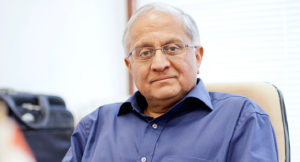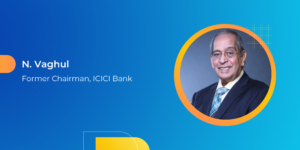Mindtree’s Subroto Bagchi urges entrepreneurs to think of their journey as a process of continuously creating infrastructure – physical, intellectual and emotional. He specifically emphasises on the importance of scaling up one’s team simply because businesses don’t go anywhere, people do

On a Friday evening in August 2011, the doorbell rang in Sasi’s house while Times Now’s Arnab Goswami was leading a heated debate in the background. Sasi’s daughter, Sanjana, opened the door and Vivek, Sasi’s classmate from ISB Batch of 2007, walked in. After graduation, both Vivek and Sasi worked for large companies in Mumbai before returning to their hometown in the southern part of India. They were armchair analysts of India Inc. and often got into discussions about India and its macroeconomic situation.
Six-year-old Sanjana interrupted their conversation. “Appa (Dad), I love this ad from Flipkart. Can you buy me a Zoop (watch) from there?” Even as Sasi began answering his daughter, Vivek interrupted: “Man, look at the kind of brand Flipkart has created. Let’s come up with something and create a startup…” He knew that Sasi had always wanted to become an entrepreneur. During their discussions, he often admired Sasi’s financial acumen and ability to think through a situation with utmost clarity. In his previous job, Sasi was known for his operational skills and the ability to execute well.
Vivek on the other hand was the ideas man. He was particularly gripped by one idea he had in the retail space. While working in Mumbai, Vivek often observed the enthusiasm of kirana storeowners, often making note of the finer nuances of how shopkeepers operate. The idea he had revolved around bringing the kirana store format to an organised, branded format. In short, he wanted to start an organised retail company, which operated a chain of kirana stores across India. His idea was that organised retail didn’t have to mean large format stores; rather, it could be many small, efficient neighbourhood stores. He explained this idea to Sasi.
Sasi, a passionate consumer marketing guy, got excited immediately and rattled out a few more ideas. He said, “In fact, we could partner with several micro-entrepreneurs to make this a reality. The organised retail company can bring in the know-how, the combined supply chain and put the systems and processes in place. A micro-entrepreneur could own and operate a series of kirana stores.” Sasi and Vivek got started on one more of their famous discussions. But, this time, there was a lot more at stake. The same night, the duo decided to sit independently and prepare a one-page executive summary of their business idea. The plan was to get together the next morning and brainstorm further.
Promptly at 6.30 a.m. the next morning, the future entrepreneurs met for a filter coffee at Elliot’s beach, Besant Nagar. Sasi and Vivek began their discussion. They had to answer several questions for themselves. “How and when should we raise external funding? What would be the business model? What would be the sales and marketing strategy?”
Sasi, with a family to take care of, was thinking about how he would manage his personal finances if he decided to startup. Vivek was grappling with figuring out the operations of a micro-entrepreneur driven model. He really liked Sasi’s suggestion. Even as Sasi was counting the money he had in fixed deposits, Vivek was thinking about companies that would be interested in buying his startup a few years from now. The discussion took various forms – dialogue, debate and often, disillusion!
Dear Entrepreneur,
Almost every one of India’s startups has been created out of such conversations. The seeds to becoming an entrepreneur are often sowed early but the myriad experiences one has along the way shapes up the thought process further. One fine day, you just decide to startup.
I created this fictional story to lay down the setting for our conversation with Subroto Bagchi, chairman, Mindtree, an IT Services company. Bagchi, of course, is also the author of several books including The High Performance Entrepreneur, The Professional, MBA at 16 and the yet-to-be-launched The Elephant Catchers. I believe that the books written by Bagchi gave him an additional opportunity to think, in depth, about his own entrepreneurial journey and this made him the right candidate to help us answer the following questions: How can you measure your entrepreneurial life? How do you device a plan for your entrepreneurial journey much like how professionals plan out their careers?
In the first part of this chat, Bagchi adds structure to how an entrepreneur should think through the early-phase of building a business. Our fictional characters, Sasi and Vivek, represent all early-stage entrepreneurs out there and, dear readers, the following paragraphs will be tremendously useful to you all as you go about dealing with various situations in the journey ahead.
The Smart CEO (TSC): In the early days, an entrepreneur is loaded with work: putting together a team, fine-tuning the idea and getting ready to clinch the early-adopter customers. What are the top three aspects he or she needs to think about on day one at the new venture?
Subroto Bagchi (SB): I believe that the most important thing is to do a formal session with the core group to decide on the mission, vision and values. It is important to tell each other why we are doing what we are doing. This helps in creating a shared vision of the future. I have documented how we did this in the Mindtree context in Making of the Mindtree.
The second thing is to take stock of the inventory of expertise in the organisation. This would indicate the key gaps. It is better to get the right sales guy early on, than have a great product idea and not know how to sell.
The third thing to do is go out there and sell like hell. Way too many entrepreneurs underestimate the importance of both sales and marketing.

TSC: How do you react to failure? How do you react to criticism?
SB: Failure is overstated. Many entrepreneurs fail because they are not prepared for success. As far as criticism is concerned, it is very important. Mindtree CFO Rostow Ravanan’s prize possession is a post card sent by a shareholder with the choicest abuses against us, in language you cannot imagine, after our IPO. I have offered many inducements to Rostow to give me that postcard but he is not parting with it. Criticism keeps us honest. It is not the criticism that I have control over; it is the response to the criticism. I need to think of myself as a fruit tree. You throw me a stone; I give you a fruit. Or the cut flower you buy at the florist. You bring home a bunch of roses, they do not shed tears, they do not complain, they make your home look more beautiful.
TSC: How do you react to that ‘initial buzz’ your offering has created, making you feel that you are doing well?
SB: Underestimate its power; see what is round the bend. Seldom, your first product, service, customer will scale. Use your early success to scale up. Don’t get caught in a deadly embrace.
TSC: You have over ten co-founders at Mindtree. What is the strategy to make the relationship between the various co-founders work?
SB: The key here is to make sure that much of it is front-loaded. In The High Performance Entrepreneur I tell my readers not to build a company with friends. Friendship and being co-founders are two completely different things. I’d say there are three fundamental aspects to make the co-founder relationship work: professional respect, shared vision and personal trust. One needs to have the ability to handle differences respectfully.
In general, co-founders must have complimentary skills. NRN (Narayana Murthy of Infosys) once explained this beautifully: “Individually, each of you must be competent. Collectively, you must be complete.” When people are individually competent and busy, there is a lesser chance of problems coming up.
The other aspect one needs to keep in mind is about the problems that come up during debate and dialogue. When Infosys (also a company with several founders) started, it was clearly decided that problems would be solved through debate and dialogue. However, it was also decided who had the last word on a particular topic. The rule was that once the decision was taken, there would be no whining or moaning. I believe this is crucial to establish who has the last word on a particular issue.
Finally, I’d like to come to the most difficult point. In my next book, I write quite a bit on this topic, the founder trap. Founders work with each other so closely that they’re emotionally invested in each other. Over time, familiarity breeds contempt. There is a chance that one of the founders is having a personal issue that is prompting him to change. It is crucial for a founder to understand that people will change, can change and must change. You must not see it as a sign of betrayal. I’d urge entrepreneurs to keep this mind.
TSC: What should your approach of working with the ecosystem – your employees, suppliers and buyers and even your competitors – be?
SB: You must look for opportunities everywhere. Be the curious little boy or girl in town. Listen a lot. Ask everyone for help. Even your competition. Sing your anthem; offer your tiny hands. The world loves it.
TSC: When should an entrepreneur figure out the overall purpose of his or her entrepreneurial journey? Does he or she want to sell the business? Does he or she want to build this up into a very large company that can be passed on to the next generation?
SB: The ideal is to build an image in your mind; imagine a future so that others, one day, may be able to live in it. Sometimes, you get it on day one. Sometimes it comes along the way. But know that you must have the power to receive when the call comes.
The worst thing you can do is to conceive a child with the goal of giving it away for adoption. Tell me, which baby would forgive you for that? If that however is inevitable, so be it. Let that day come when the baby is going to be in better hands. But on day one, if selling your company is on your mind, even if it is a silent thought, people get to know about it. If you as co-founders are not committed, why do you think the janitor would be?
TSC: How do you factor in risk – personal and business – into your plans?
SB: Risk is the most overstated idea in town. I have talked about it in my essay The Fallen Tomato Cart (Please Google for it). People cover up their personal lack of desire for entrepreneurship and quote risks. You don’t need to look at entrepreneurs to relate to the idea of risk. The average soldier takes risks that are far greater — what about dying? The local small-time politician takes bigger risks –what about losing the election? The average doctor in the nearby hospital takes bigger risks — what about contracting bird-flu? And if that is not all, think of going to work tomorrow and a terrorist mopping you off? Didn’t that happen to the employees at the Taj on 9/11? How is it any different with entrepreneurs?
TSC: Anything else that one should think about in the early-phase?
SB: Pay attention to governance. Articulate it before you open the bank account for the business. Oh, there is one more thing. I’d urge entrepreneurs to go kiss the world. It is the best advice I’ve received and I received it from my mother when she was on her deathbed.

At the headquarters of fiction kirana pvt. Ltd.
Our fictional entrepreneurs, Sasi and Vivek, have made good progress with their kirana-style organised retail idea. It is December 2012 and in a year and a half, the duo has already partnered with two micro-entrepreneurs and Fiction Kirana manages three neighbourhood grocery stores in Chennai. Brainstorming at their headquarters in Alwarpet, a stone’s throw away from their first store in CIT Colony, Sasi and Vivek are looking at their MIS reports.
Vivek has some comforting words for Sasi: “We’ve done reasonably well, at least in terms of proving that our model works. Our CIT Colony store is probably the best operated store in the neighbourhood, our partner (the micro-entrepreneur) is very happy with us and I am convinced we have a model that can scale.” Sasi responds: “The main worry is about all the attrition we’re dealing with at the store level and sorting out our delivery process. We also need to raise money quickly and put together a good middle management team.”
As Vivek and Sasi go back and forth, it is clear that they are in the middle of their execution-phase. The model does seem like a good one but the entrepreneurs are dealing with several challenges – fund-raising for a new concept, creating a document for standard operating procedures (systems and processes) that people could follow and most importantly, hiring strategies, both at the store as well as at the corporate level.
Right after building the foundation, entrepreneurs grapple with several problems just as they are getting ready to scale up. Decision-makers need to ask tough questions about their own businesses and quite often, it’s the market that will let them know if a decision was a good one or not. In this phase, the problems are usually industry-specific, but we turned to Bagchi for some general advice on how to manage oneself in the execution-phase.
TSC: How does an entrepreneur tackle the execution challenge?
SB: Execution is everything. A first-rate idea and poor execution leads you nowhere. A second-rate idea and first-rate implementation can take you places. Yes, the execution focus is what defines the entrepreneurial spirit. It is what must possess you every single day. Even on the day that you hate getting up from bed, execute something in the mind.
TSC: What kind of approach to systems and procedures would you recommend?
SB: I maintain that systems and processes alone help you scale up. They cannot be an afterthought. Too many entrepreneurs think of crossing the ocean over a bamboo bridge. It works only for the Gods. Sometimes, it may even work for a human being. But it is not scalable.
Think of your enterprise as a continuous effort to create infrastructure. Build the physical infrastructure with love; build the intellectual infrastructure (of which systems and processes are a part) with future value in mind and build the emotional infrastructure based on the idea of legacy.
TSC: You cannot control some external factors, how do you deal with these?
SB: Look at them as opportunities. If they are good, harvest them. If they are bad, they will eliminate a few players who are crowding your space and help to push you forward.
TSC: Fundamentally, how should an entrepreneur approach the growth phase?
SB: I have dealt with the idea of scale extensively in my next book The Elephant Catchers (Hachette), due in August. In it, I argue that the first step is to get comfortable with the idea of scale. Then you need to know what factors help you scale and hinder from a customer angle. As you go along, you have to scale your intellect. That is all about tapping into knowledge beyond your self. You have to scale your reputation; reputation is capital. You also have to scale people because business is an inanimate thing; businesses don’t go anywhere, people do. So, you have to scale your people. Then, of course, is the issue of scaling your own self as a founder-leader-entrepreneur-human being. So, read the book; I have given away all my knowledge until now in this book.
TSC: Let us assume an entrepreneur is faced with the following situation. A very reputed senior member of his advisory board advices him on a set of next steps that he doesn’t agree with. What should the entrepreneur do?
SB: In general, entrepreneurs are type-A personalities who are very opinionated. The downside of that is you can go wrong a few times, but 90 per cent of the time, you know right from wrong and you don’t need an external sounding board. However, some entrepreneurs suffer from confirmation bias. They need external validation of their ideas. But think about it. It is you who is going to execute on that advice. It is you who will face the consequences of implementing that advice. Think about the potential consequences of implementing your own plans and see if you can make peace with each of the outcomes. If you suffer from confirmation bias, you are digging your own grave.
TSC: Two co-founders aren’t able to agree on their firm’s expansion strategy. Both of them are convinced that their own strategy is what the market will want. How should they handle such a situation?
SB: In this situation, the founders should spend money and go get first-rate advice. There are some very good consultants available who can help you in specific domains. If the difference of opinion is on the branding front, go seek advice from a branding expert and so on. Don’t pit your head against each other; don’t bloody the wall. Spend money and go get first-rate advice.

TSC: One of your earliest employees was very happy with the firm. She thoroughly enjoyed working there. In the scaling up phase, she felt there were too many new people given more importance than her. How would you, as a co-founder, address this situation?
SB: This is something that happens in every company. To deal with this situation, first have an open conversation with yourself. In most such cases, the problem arises because the early employee cannot lower her ambition or increase her capability. This leaves her emotionally drained. One thing you could look at is to offer her a customised package. See if you could give her additional responsibilities elsewhere in the firm. However, if she’s still not happy, sit down and have an open chat. I’d advice entrepreneurs to never fly with a tired crew. If the person is drained and not happy, let her go. However, be humane in the exit package you offer the person.
TSC: Your business did not scale up as planned. Your venture capital investor (who has been invested for six years) wants to exit. But, if he could wait patiently for three more years, there is a chance the company could turnaround. What should your pitch be to a VC?
SB: Sell off your wife’s jewellery and buy the company! Entrepreneurs need to understand that VCs are answerable to their investors. Never expect the VC to love you. The VC’s job is to love his money. Don’t try to emotionally appeal to him. Give him an exit, somehow, but try and see if you can negotiate it to your best advantage.
TSC: You are building a business in a sector that is very challenging, where some of the larger players are struggling. However, you are convinced the plan works brilliantly and you have some numbers (and survey data) to prove your new model has tremendous potential. How do you validate your business model?
SB: First and foremost, don’t look at survey data. The guy who took the survey does not know your business model. You have to seek your own questions and your own answers. The questions you ask yourself must be unusual. The trick here is to work things out in a future-backwards manner. Try and predict for yourself how the future will play out. Try and get into the customer’s head and think about how he will shop, what he will buy and how much he will pay for your offering. In some cases, it might help to understand what will influence your customer’s behavior. Ask yourself two questions: Do you love your idea? Do you have the competence to implement it? If the answers are yes, do not look for additional confirmation.
TSC: In case you fail, do you start up again? Do you take up a job? How should one analyse the next steps?
SB: In The High Performance Entrepreneur and Go Kiss the World, I have told the story about how my first company folded up and how I returned to the industry to work as a professional-employee for the next 11 years. Yes, be realistic if you fail. Do not deflate the reason to the environment. Look inside for the reasons and then take realistic measures. Get back to work if that is what is needed and take some time to figure out where you went wrong and return wiser and make sure this time around, you do not make the same mistakes.
TSC: If you succeed and make a ton of money, what next? Some turn to angel investing. Some take up philanthropic work. Some work with the Government. How does one think through the next steps?
SB: I don’t know; I am not there yet. But as for “doing good”, it does not have to wait until the end. You can do it as you go along.
TSC: At a broad level, as you start feeling successful and your business does well, how should you approach a typical day at work?
SB: I like to spend the day with people; working with people, thinking about people. To me people are my purpose. Without them around me and without them in my mind, I wilt.
TSC: What are the top five rules entrepreneurs MUST follow?
SB: This one is pretty straightforward:
- Sell like hell – get in front of customers everyday
- Get paying customers; businesses are built with cash
- Make no false comparisons; just stay invested – if you build value, the company will be valuable
- Don’t compete with your own people; surround yourself with giants
- Look at your life as an opportunity to serve: your customers, your people, your investors
Subroto Bagchi
Co-founder and Chairman, Mindtree
The entrepreneur
Bagchi served as Chief Operating Officer at Mindtree from 1999 to 2007. After the company’s IPO in 2007, he took on a unique role of working full-time with the top-100 leaders of Mindtree, helping them get ready for the future. During this phase, he held the title ‘Gardener’ (I have explained the role in detail in my editor’s note). In 2010, he became Vice Chairman and exactly a year back on April 1, 2012, he became the Chairman of the company.
Right after Mindtree was formed in 1999, the economic recession put forth a major challenge to the company. During this phase, Bagchi moved to the U.S., kept the leadership team together and positioned the company in the market as the best mid-size IT services company from India. Mindtree’s handling of the tough early-phase played a crucial role in making the company what it is today.
The author
Bagchi is widely accepted as one of India’s best selling business authors. His four books – The High Performance Entrepreneur, Go Kiss the World, The Professional and MBA at 16 – were all born out of his own journey as an entrepreneur and professional and were written to share his personal lessons with several people across the world.
During our interview, we specifically asked Bagchi about his book MBA at 16. This is what he had to say: “There are two reasons why I wrote this book. When I was a child, my eldest brother, who was 14 years older, was a mentor to me. At the age of 21 he was a young IAS officer and I used to accompany him sometimes on his official trips. I was just seven at that time, yet I learnt so much from him. I learnt about rural economics, about the role of the collector and several things about public administration. He imbibed in me the importance of giving away your intellectual legacy. I have been very influenced by that.
Also, I had written books for entrepreneurs and professionals and I thought to myself that I hadn’t done enough for the next generation. I wanted to write a book for really young people to give them a glimpse of the business world. Young people pick up knowledge from various places – from newspapers, movies or even from people they know. They read about Narayana Murthy or an Azim Premji or a TVS Group or a Murugappa Group or a Selco and understand that there are different approaches to running a business. I wanted to give them information in an engaging manner so they have information to decode and look at things from various perspectives.”
The personal
On this front, we asked Bagchi only one question – what is he thinking at a personal level every single day? His response, in inimitable Bagchi-style, “Sweeping Susmita (Bagchi, his wife) off her feet.”





